小学英语语法时态讲解与归纳一般现在时
小学英语中五大语法时态详解

小学英语中五大语法时态详解在小学英语学习中,掌握语法时态是非常重要的一部分。
正确运用时态可以帮助我们准确表达过去、现在和将来的事情。
下面将详细介绍小学英语中的五大语法时态。
一、一般现在时(Simple Present Tense)一般现在时用于描述经常发生的动作、事实或习惯。
它的构成非常简单,一般情况下只需在动词原形后加上“s”或“es”。
例如:1. I eat an apple every day.(我每天吃一个苹果。
)2. She goes to school by bus.(她乘公交车去学校。
)二、一般过去时(Simple Past Tense)一般过去时用于描述过去发生的动作或状态。
大部分动词的过去式是在动词原形后加上“ed”。
例如:1. We played soccer yesterday.(我们昨天踢足球。
)2. He watched a movie last night.(他昨晚看了一部电影。
)三、一般将来时(Simple Future Tense)一般将来时用于描述将来要发生的动作或事件。
它的构成通常是在动词前加上“will”。
例如:1. I will visit my grandparents next week.(下周我将去拜访我的祖父母。
)2. She will learn to play the piano in the future.(她将来会学弹钢琴。
)四、现在进行时(Present Continuous Tense)现在进行时用于描述正在进行的动作。
它的构成是“be动词+动词的现在分词”。
例如:1. They are playing basketball in the park.(他们正在公园里打篮球。
)2. I am studying for the exam.(我正在备考考试。
)五、过去进行时(Past Continuous Tense)过去进行时用于描述过去某个时间正在进行的动作。
(完整版)小学英语语法_四大时态

四大时态复习1. 一般现在时(1)一般现在时的构成(肯定句)☆be动词:主语+be(am,is,are)+其它。
如:I am a boy.我是一个男孩。
☆行为动词:主语+行为动词(+其它)。
如:We study English.我们学习英语。
☆当主语为第三人称单数(he, she,it)时,要在动词后加"-s"或"-es"。
如:Mary likes Chinese. 玛丽喜欢汉语。
(2)一般现在时的变化☆. be动词的变化。
[否定句]:主语+ be + not +其它。
如:He is not a worker.他不是工人。
[一般疑问句]:Be +主语+其它。
如:-Are you a student? -Yes. I am. / No, I'm not.[特殊疑问句]:疑问词+一般疑问句。
如:Where is my bike?☆.行为动词的变化。
[否定句]:主语+ don't( doesn't ) +动词原形(+其它)。
如:I don't like bread.当主语为第三人称单数时,要用doesn't构成否定句。
如:He doesn't often play.[一般疑问句]:Do( Does ) +主语+动词原形+其它。
如:- Do you often play football?- Yes, I do. / No, I don't.当主语为第三人称单数时,要用does构成一般疑问句。
如:- Does she go to work by bike? - Yes, she does. / No, she doesn't.[特殊疑问句]:疑问词+一般疑问句。
如:How does your father go to work?*动词+s的变化规则1.一般情况下,直接加-s,如:cook-cooks, milk-milks2.以s. x. sh. ch. o结尾,加-es,如:guess-guesses, wash-washes, watch-watches, go-goes 3.以“辅音字母+y”结尾,变y为i, 再加-es,如:study-studies2.现在进行时(1)一般现在时的构成:be(am,is, are)+ 动词的ing形式。
(完整版)小学英语语法六种时态

小学英语语法【一】一般现在时一般现在时基本用法介绍一、一般现在时的功能1.表示事物或人物的特征、状态。
如:The sky is blue.天空是蓝色的。
2.表示经常性或习惯性的动作。
如:I get up at six every day.我每天六点起床。
3.表示客观现实。
如:The earth goes around the sun.地球绕着太阳转。
二、一般现在时的构成1.be动词:肯定句:主语+be(am,is,are)+其它。
如:I am a boy. 我是一个男孩。
2.行为动词:肯定句:主语+行为动词(+其它)。
如:We study English.我们学习英语。
当主语为第三人称单数(he, she,it)时,要在动词后加"-s"或"-es"。
如:Mary likes Chinese.玛丽喜欢汉语。
动词+s的变化规则1.一般情况下,直接加-s,如:cook-cooks,2.以s. x. sh. ch. o结尾,加-es,如:guess-guesses, wash-washes, watch-watches, go-goes3.以“辅音字母+y”结尾,变y为i, 再加-es,如:study-studies特殊:have----has三、一般现在时的变化1.be动词的变化。
否定句:主语+ be + not +其它。
如:He is not a worker.他不是工人。
一般疑问句:Be +主语+其它。
如:-Are you a student? -Yes. I am. / No, I'm not.特殊疑问句:疑问词+一般疑问句。
如:Where is my bike?2.行为动词的变化。
否定句:主语+ don't( doesn't ) +动词原形(+其它)。
如:I don't like bread.当主语为第三人称单数时,要用doesn't构成否定句。
英语学习:一般现在时语法解释大全
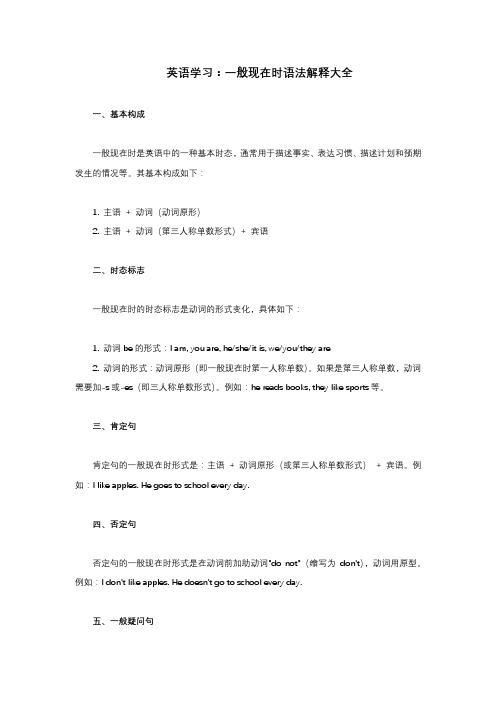
英语学习:一般现在时语法解释大全一、基本构成一般现在时是英语中的一种基本时态,通常用于描述事实、表达习惯、描述计划和预期发生的情况等。
其基本构成如下:1. 主语+ 动词(动词原形)2. 主语+ 动词(第三人称单数形式)+ 宾语二、时态标志一般现在时的时态标志是动词的形式变化,具体如下:1. 动词be的形式:I am, you are, he/she/it is, we/you/they are2. 动词的形式:动词原形(即一般现在时第一人称单数)。
如果是第三人称单数,动词需要加-s或-es(即三人称单数形式)。
例如:he reads books, they like sports等。
三、肯定句肯定句的一般现在时形式是:主语+ 动词原形(或第三人称单数形式)+ 宾语。
例如:I like apples. He goes to school every day.四、否定句否定句的一般现在时形式是在动词前加助动词"do not"(缩写为don't),动词用原型。
例如:I don't like apples. He doesn't go to school every day.五、一般疑问句一般疑问句的一般现在时形式是把助动词"do"或"does"放在句首,动词用原型。
例如:Do you like apples? Does he go to school every day?六、特殊疑问句特殊疑问句的一般现在时形式是以疑问词开头,后面接一般疑问句。
例如:What do you like? Where does he go to school?七、第三人称单数当主语是第三人称单数(he/she/it)时,动词需要变为第三人称单数形式,一般在动词后加-s或-es。
例如:he reads books, she goes to the park等。
一般现在时 第三人称单数、疑问句
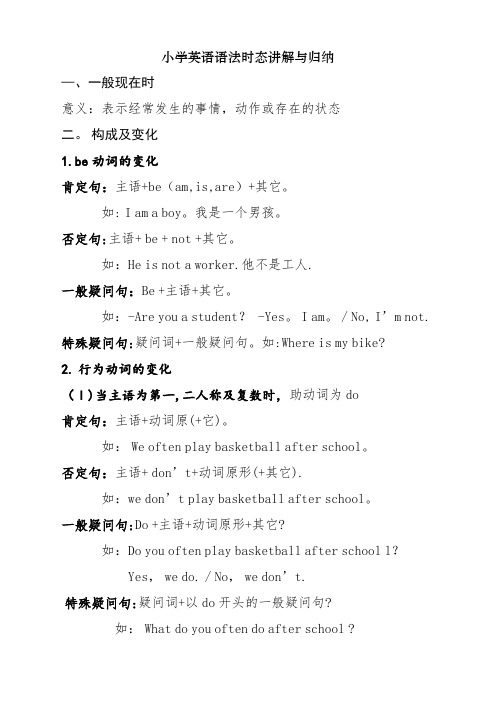
小学英语语法时态讲解与归纳—、一般现在时意义:表示经常发生的事情,动作或存在的状态二。
构成及变化1.be动词的变化肯定句:主语+be(am,is,are)+其它。
如:I am a boy。
我是一个男孩。
否定句:主语+be+not+其它。
如:He is not a worker.他不是工人.一般疑问句:Be+主语+其它。
如:-Are you a student?-Yes。
I am。
/No,I’m not.特殊疑问句:疑问词+一般疑问句。
如:Where is my bike?2.行为动词的变化(l)当主语为第一,二人称及复数时,助动词为do肯定句:主语+动词原(+它)。
如:We often play basketball after school。
否定句:主语+don’t+动词原形(+其它).如:we don’t play basketball after school。
一般疑问句:Do+主语+动词原形+其它?如:Do you often play basketball after school l?Yes,we do./No,we don’t.特殊疑问句:疑问词+以do开头的一般疑问句?如:What do you often do after school?(2)当主语为第三人称单数时,助动词为does肯定句:主语+动词三单式(+其它).如:He swims well。
否定句:主语+doesn’t+动词原形(+其它)。
如:He doesn't swim well.一般疑问句:Does+主语+动词原形+其它。
如:Does he swim well?Yes,he does。
/No,he doesn't.特殊疑问句:疑问词+以does开头的一般疑问句?如:How does your father go to work?三.第三人称单数的动词变化规则(只有在第三人称为主语的肯定句中,动词才用三单式)(1)多数动词直接加s:runs gets likes collets takes plays climbs…….(2)结尾是s,x,sh,ch,o,前为辅音字母,结尾加es:watches teaches goes does washes crossesmixes brushes(3)动词末尾y前为辅音:将y改为i加es:study→studies fly→flies carry→carries cry→cries但在y前如果为元音则直接加s:buys says四.时间标志:always,usually,often,sometimes,every…一般现在时练习He often (have) dinner at home.Daniel and Tommy (be) in Class One。
小学英语语法-一般现在时详细讲解

小学英语语法-一般现在时详细讲解一般现在时是英语语法中最基础也是最常用的时态之一。
它表示的是习惯性、经常性和普遍性的行为或状态。
在本文中,我将详细介绍一般现在时的形式、用法和注意事项。
一、一般现在时的形式一般现在时的肯定句的基本结构是:主语+谓语动词+其他。
谓语动词在第三人称单数形式时要加上-s或-es。
例如:- I eat breakfast every morning.(我每天早上吃早饭。
)- She goes to school by bus.(她坐公共汽车去学校。
)否定句的结构是:主语+do not/does not+动词原形+其他。
例如:- I do not like coffee.(我不喜欢咖啡。
)- He does not play football.(他不踢足球。
)疑问句的结构是:Do/Does+主语+动词原形+其他?例如:- Do you like ice cream?(你喜欢冰淇淋吗?)- Does she go to the park every weekend?(她每个周末去公园吗?)二、一般现在时的用法第1页/共4页1. 表示习惯或经常性的动作:- I write in my diary every night.(我每天晚上写日记。
)- They play basketball every Sunday.(他们每个星期天打篮球。
)2. 表示客观事实、自然规律或科学真理:- Water boils at 100 degrees Celsius.(水在100摄氏度时煮沸。
)- The sun rises in the east.(太阳从东方升起。
)3. 表示感觉、想法和喜好:- I love chocolate.(我喜欢巧克力。
)- He hates to wake up early.(他讨厌早起。
)4. 表示现时状态或现时临时的动作:- I am a student.(我是一个学生。
小学英语语法知识点一般现在时
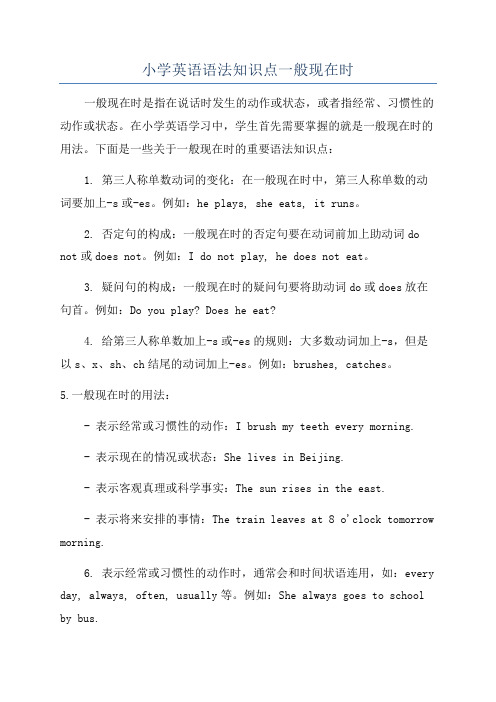
小学英语语法知识点一般现在时一般现在时是指在说话时发生的动作或状态,或者指经常、习惯性的动作或状态。
在小学英语学习中,学生首先需要掌握的就是一般现在时的用法。
下面是一些关于一般现在时的重要语法知识点:1. 第三人称单数动词的变化:在一般现在时中,第三人称单数的动词要加上-s或-es。
例如:he plays, she eats, it runs。
2. 否定句的构成:一般现在时的否定句要在动词前加上助动词do not或does not。
例如:I do not play, he does not eat。
3. 疑问句的构成:一般现在时的疑问句要将助动词do或does放在句首。
例如:Do you play? Does he eat?4. 给第三人称单数加上-s或-es的规则:大多数动词加上-s,但是以s、x、sh、ch结尾的动词加上-es。
例如:brushes, catches。
5.一般现在时的用法:- 表示经常或习惯性的动作:I brush my teeth every morning.- 表示现在的情况或状态:She lives in Beijing.- 表示客观真理或科学事实:The sun rises in the east.- 表示将来安排的事情:The train leaves at 8 o'clock tomorrow morning.6. 表示经常或习惯性的动作时,通常会和时间状语连用,如:every day, always, often, usually等。
例如:She always goes to school by bus.7. 表示现在的情况或状态时,通常与be动词连用,如:am, is, are。
例如:I am a student.8. 表示客观真理或科学事实时,通常不和时间状语连用。
例如:Water boils at 100 degrees Celsius.9.一般现在时中的一些特殊用法:- 示意要求或建议的动词(如:want, need, like, love, hate等)后接不定式,用法类似于祈使句。
一般现在时第三人称单数、疑问句
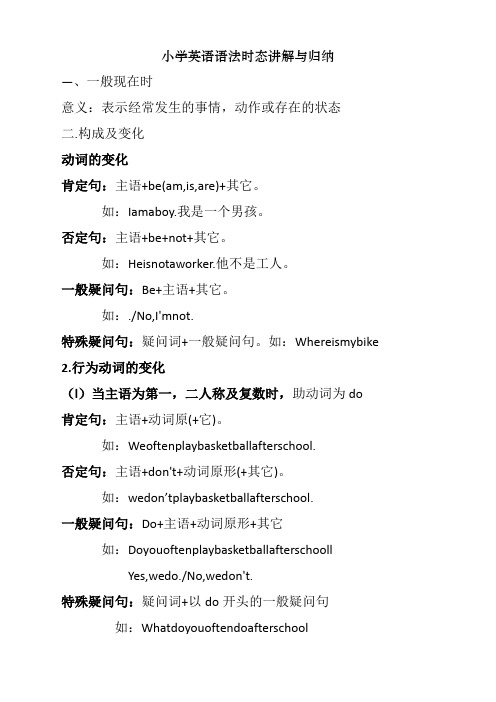
小学英语语法时态讲解与归纳—、一般现在时意义:表示经常发生的事情,动作或存在的状态二.构成及变化动词的变化肯定句:主语+be(am,is,are)+其它。
如:Iamaboy.我是一个男孩。
否定句:主语+be+not+其它。
如:Heisnotaworker.他不是工人。
一般疑问句:Be+主语+其它。
如:./No,I'mnot.特殊疑问句:疑问词+一般疑问句。
如:Whereismybike 2.行为动词的变化(l)当主语为第一,二人称及复数时,助动词为do肯定句:主语+动词原(+它)。
如:Weoftenplaybasketballafterschool.否定句:主语+don't+动词原形(+其它)。
如:wedon’tplaybasketballafterschool.一般疑问句:Do+主语+动词原形+其它如:DoyouoftenplaybasketballafterschoollYes,wedo./No,wedon't.特殊疑问句:疑问词+以do开头的一般疑问句如:Whatdoyouoftendoafterschool(2)当主语为第三人称单数时,助动词为does肯定句:主语+动词三单式(+其它)。
如:Heswimswell.否定句:主语+doesn’t+动词原形(+其它)。
如:Hedoesn’tswim well.一般疑问句:Does+主语+动词原形+其它。
如:DoesheswimwellYes,hedoes./No,hedoesn't.特殊疑问句:疑问词+以does开头的一般疑问句如:Howdoesyourfathergotowork三.第三人称单数的动词变化规则(只有在第三人称为主语的肯定句中,动词才用三单式)(1)多数动词直接加s:runs getslikescolletstakesplays climbs…….(2)结尾是s,x,sh,ch,o,前为辅音字母,结尾加es:watches teaches goes does washes crossesmixes brushes(3)动词末尾y前为辅音:将y改为i加es:study→studiesfly→fliescarry→carriescry→cries但在y前如果为元音则直接加s:buyssays四.时间标志:always,usually,often,so metimes,every…一般现在时练习Heoften (have)dinnerathome. DanielandTommy (be)inClassOne.We (notwatch)TVonMonday.Nick (notgo)tothezooonSunday.they (like)theWorldCupWhattheyoften (do)onSaturdaysyourparents(read)newspaperseverydayThegirl (teach)usEnglishonSundays.SheandI(take)awalktogethereveryevening.There(be)somewaterinthebottle.Mike____(like)cooking.They____ (have)thesamehobby.Myaunt____(look)afterherbabycarefully. Youalways______(do)yourhomeworkwell.I (be)’mstayinginbed.She (go)toschoolfromMondaytoFriday.LiuTao_____(do)notlikePE.Thechildoften_____(watch)TVintheevening. SuHaiandSuYang____(have)eightlessonsthisterm.-Whatday___(be)ittoday-It’sSaturdayWinter, spring, summer and autumn (be)seasons.Danny (take) off his T-shirt now.Today (teach) a science lesson.Jenny and I (live) in Canada.Jenny (want) to go to school in chinaLet me (help) youShe eats a sandwich(总是)Li Ming goes to school by bicycle(有时)。
小学六年重要知识点解析时态的正确使用
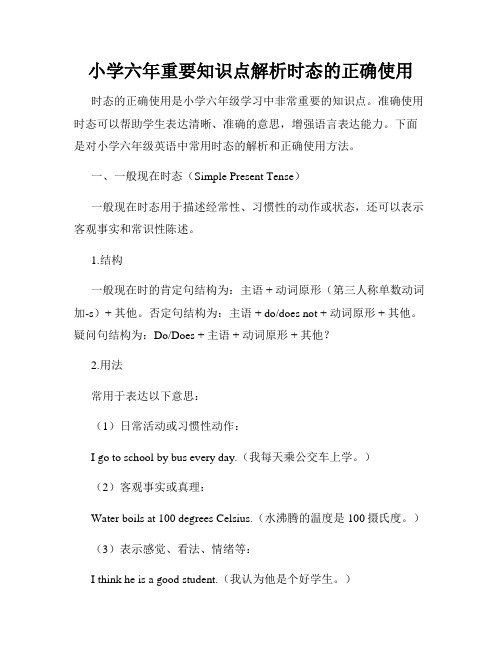
小学六年重要知识点解析时态的正确使用时态的正确使用是小学六年级学习中非常重要的知识点。
准确使用时态可以帮助学生表达清晰、准确的意思,增强语言表达能力。
下面是对小学六年级英语中常用时态的解析和正确使用方法。
一、一般现在时态(Simple Present Tense)一般现在时态用于描述经常性、习惯性的动作或状态,还可以表示客观事实和常识性陈述。
1.结构一般现在时的肯定句结构为:主语 + 动词原形(第三人称单数动词加-s)+ 其他。
否定句结构为:主语 + do/does not + 动词原形 + 其他。
疑问句结构为:Do/Does + 主语 + 动词原形 + 其他?2.用法常用于表达以下意思:(1)日常活动或习惯性动作:I go to school by bus every day.(我每天乘公交车上学。
)(2)客观事实或真理:Water boils at 100 degrees Celsius.(水沸腾的温度是100摄氏度。
)(3)表示感觉、看法、情绪等:I think he is a good student.(我认为他是个好学生。
)二、一般过去时态(Simple Past Tense)一般过去时态用于过去发生的动作、事件或存在的状态。
1.结构一般过去时的肯定句结构为:主语 + 动词过去式 + 其他。
否定句结构为:主语 + did not + 动词原形 + 其他。
疑问句结构为:Did + 主语 + 动词原形 + 其他?2.用法常用于表达以下意思:(1)过去发生的动作或事件:I visited my grandparents last weekend.(上周末我去看望了我的祖父母。
)(2)过去的习惯性动作:She always played the piano when she was young.(她年轻时总是弹钢琴。
)(3)表示过去的状态或存在:They lived in Paris for five years.(他们在巴黎住了五年。
小学英语语法时态讲解与归纳一般现在时

千里之行,始于足下。
小学英语语法时态讲解与归纳一般现在时一般现在时(Simple Present Tense)是表示经常性、习惯性或普遍性的动作或状态的时态。
它用于描述我们现在经常或总是发生的动作、习惯、经验、事实和固定的真理。
下面是小学英语语法时态讲解与归纳一般现在时的内容:1. 构成一般现在时的肯定句结构为:主语 + 动词原形(第三人称单数加-s)+ 其他。
例如:- I play soccer every Saturday.(我每个星期六踢足球。
)- She eats an apple every morning.(她每天早上吃一个苹果。
)2. 第三人称单数的变化在一般现在时中,第三人称单数的动词要加上-s、-es或-ies。
例如:- She plays soccer every Saturday.(她每个星期六踢足球。
)- He eats an apple every morning.(他每天早上吃一个苹果。
)- My brother watches TV every night.(我的哥哥每天晚上看电视。
)3. 否定句和疑问句第1页/共3页锲而不舍,金石可镂。
- 否定句:在动词前加do not(don't)或does not(doesn't)。
例如:- I don't play soccer every Saturday.(我不是每个星期六踢足球。
)- She doesn't eat an apple every morning.(她不是每天早上吃一个苹果。
)- 疑问句:将助动词do(does)提到主语前。
例如:- Do you play soccer every Saturday?(你每个星期六踢足球吗?)- Does she eat an apple every morning?(她每天早上吃一个苹果吗?)4. 频率副词频率副词用来修饰动词,表示动作发生的频率。
小学英语语法时态一般现在时
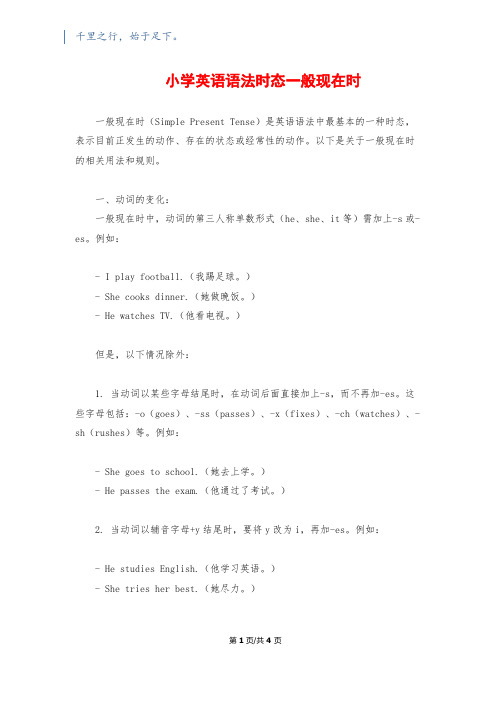
小学英语语法时态一般现在时一般现在时(Simple Present Tense)是英语语法中最基本的一种时态,表示目前正发生的动作、存在的状态或经常性的动作。
以下是关于一般现在时的相关用法和规则。
一、动词的变化:一般现在时中,动词的第三人称单数形式(he、she、it等)需加上-s或-es。
例如:- I play football.(我踢足球。
)- She cooks dinner.(她做晚饭。
)- He watches TV.(他看电视。
)但是,以下情况除外:1. 当动词以某些字母结尾时,在动词后面直接加上-s,而不再加-es。
这些字母包括:-o(goes)、-ss(passes)、-x(fixes)、-ch(watches)、-sh(rushes)等。
例如:- She goes to school.(她去上学。
)- He passes the exam.(他通过了考试。
)2. 当动词以辅音字母+y结尾时,要将y改为i,再加-es。
例如:- He studies English.(他学习英语。
)- She tries her best.(她尽力。
)第1页/共4页3. 当动词以-e结尾时,只需加上-s。
例如:- They write letters.(他们写信。
)- He can dance.(他会跳舞。
)二、用法:1. 描述客观事实或经常性动作:一般现在时常用于描述客观事实或经常性动作。
例如:- Water boils at 100 degrees Celsius.(水沸腾的温度是100摄氏度。
)- I usually go to bed at 10 o'clock.(我通常在10点钟上床睡觉。
)2. 描述现阶段的状态:一般现在时还可用来描述现阶段的状态或对现实情况的评论。
例如:- They live in New York.(他们住在纽约。
)- She looks tired.(她看起来很累。
小学英语语法时态讲解与归纳

小学英语语法时态讲解与归纳—一般现在时一、一般现在时:1. 表示事物或人物的特征、状态。
如:The sky is blue天空是蓝色的。
2. 表示经常性或习惯性的动作。
如:I get up at six every day我每天六点起床。
3. 表示客观现实。
如:The earth goes around the su地球绕着太阳转。
二. 构成及变化1. be 动词的变化。
肯定句:主语+be(am,is,are)+ 其它。
如:I am a boy. 我是一个男孩。
否定句:主语+ be + not + 其它。
如:He is not a worker. 他不是工人。
一般疑问句:Be +主语+其它。
如:-Are you a student? -Yes. I am. / No,I'm not.特殊疑问句:疑问词+一般疑问句。
如:Where is my bike?2. 行为动词的变化。
l 、当主语为第一,二人称及复数时,助动词为do肯定句:主语+动词原形(+其它)。
如:Weoften play basketball after school. 否定句:主语+ don't+ 动词原形(+其它)。
如:wedon't play basketball after school.一般疑问句:Do +主语+动词原形+其它?如:Do you often play basketball after school l? Yes, we do. / No, we don't.特殊疑问句:疑问词+以do开头的一般疑问句?如:What do you often do after school ?3. 当主语为第三人称单数时,助动词为does肯定句:主语+动词三单式(+ 其它)。
如:He swims well.否定句:主语+ doesn ' t+动词原形(+其它)。
如:He doesn' t swim well.. 一般疑问句:Does +主语+动词原形+其它。
小学英语时态总结及用法

小学英语时态总结及用法一、一般现在时用法:1.表示经常性、习惯性的动作或存在的状态。
2.表示客观事实或普遍真理。
例句:I often go to school by bus.(我经常乘公交车去上学。
)The sun rises in the east.(太阳从东方升起。
)二、现在进行时表示正在进行的动作或情况。
常与now, at this moment, these days等时间状语连用。
例句:They are playing football now.(他们现在正在踢足球。
)I am studying English these days.(这些天我正在学习英语。
)三、一般过去时用法:表示过去某个时间发生的动作或存在的状态。
常与yesterday, last week, ago等时间状语连用。
例句:I went to the park yesterday.(我昨天去了公园。
)She had a cold last week.(她上周感冒了。
)四、一般将来时用法:表示将来某个时间要发生的动作或存在的状态。
常与tomorrow, next week, in the future等时间状语连用。
例句:I will go to the zoo tomorrow.(我明天要去动物园。
)They are going to have a party next week.(他们下周要举行一个聚会。
)五、现在完成时用法:表示过去发生的动作对现在造成的影响或结果。
常与already, yet, just, ever, never等副词连用。
例句:I have already finished my homework.(我已经完成了我的家庭作业。
)She has never been to Beijing.(她从未去过北京。
)通过以上总结,希望同学们能够更好地掌握小学英语中的基本时态及其用法,为日后的英语学习打下坚实的基础。
2021年小学英语语法时态讲解与归纳一般现在时

小学英语语法时态讲解与归纳—一般现在时欧阳光明(2021.03.07)一. 意义:表示经常发生的事情,动作或存在的状态二. 构成及变化1.be动词的变化。
肯定句:主语+be(am,is,are)+其它。
如:I ama boy.我是一个男孩。
否定句:主语+ be + not +其它。
如:He is not a worker.他不是工人。
一般疑问句:Be +主语+其它。
如:-Are you a student? -Yes. I am. / No, I'm not.特殊疑问句:疑问词+一般疑问句。
如:Where is my bike?2. 行为动词的变化。
l、当主语为第一,二人称及复数时,助动词为do肯定句:主语+动词原形(+其它)。
如:We often play basketball after school.否定句:主语+ don't+动词原形(+其它)。
如:we don’t play basketball after school.一般疑问句:Do +主语+动词原形+其它?如: Do you often play basketball after school l? Yes, we do. / No,we don't.特殊疑问句:疑问词+以do开头的一般疑问句?如: What do you often do after school ?2、当主语为第三人称单数时 ,助动词为does肯定句:主语+动词三单式(+其它)。
如: He swims well.否定句:主语+ doesn’t+动词原形(+其它)。
如:He doesn’t swim well..一般疑问句:Does +主语+动词原形+其它。
如:Does he swim well ?Yes, he does. / No, he doesn't.特殊疑问句:疑问词+以does开头的一般疑问句?如: How does your father go to work?三.第三人称单数的动词变化规则(只有在第三人称为主语的肯定句中,动词才用三单式)(1)多数动词直接加s: runsgetslikescolletstakesplaysclimbs…….(2)结尾是s, x, sh, ch, o,前为辅音字母,结尾加es :watchesteachesgoesdoeswashescrossesmixesbrushes (3)动词末尾y前为辅音:将y改为i加es: study→studies fly→flies carry→carriescry→cries但在y前如果为元音则直接加s:buyssays四.时间标志:always , usually , often , sometimes ,every…一般现在时练习题(1)I.用下列单词的适当形式填空1.We often___________(play) in the playground.2.He _________(get) up at six o’clock.3.__________you _________(brush) your teeth every morning?4.What________________(do) he usually________________(do) after school?5.Danny ________________(study) English, Chinese, maths, science and Art at school.6.Mike sometimes __________(go) to the park with his sister.7.At eight at night, she __________(watch) TV with his parents.8.________ Mike________(read) English every day?9.How many lessons_________your classmates________(have) on Monday?10.What time_________his mother_________(do) the housework? II.改句子1.Do you often play football after school? (改为肯定句)2.I have many books.(改为否定句)3.Gao Shan’s sister likes playing table tennis (改为否定句)4.She lives in a small town near New York.(改为一般疑问句)5.I watch TV every day.(改为一般疑问句)6.We have four lessons.(改为否定句)7.Nancy doesn’t run fast (改为肯定句)8.My dog runs fast.否定句:一般疑问句:9.Mike has two letters for him.一般疑问句:否定句:10.I usually play football on Friday afternoon.否定句:一般疑问句:划线提问11.Su Yang usually washes some clothes on Saturday.否定句:一般疑问句:划线提问:12.Mingming usually waters the flowers every day.否定句:一般疑问句:13.Tom does his homework at home.否定句:一般疑问句:一般现在时练习题(2)一、用所给动词的真确形式填空1.I like ____________ (swim).2.He _________(read) English every day.3.We _________(go)to school at seven in the morning.4.Mike________(go)to school at seven in the morning.5.My mother________(like) ______(go) shopping.6.I can ________(draw) many beautiful pictures.7.She_________(make) a model plane.8.Do you ________(like)_________(run)?9.Does he_________(like)_________(jump) ?10.Does Nancy_________(grow)flowers on Saturday ?11.The teachers________(like)___________(dance).12.The teacher________(like)____________(dance).13.The students___________(speak) English in class.14.The student_________(speak) Chinese after class.15. Let’s____________and play football . ( go )16. He_____________ like swimming . ( not )17. I’m sorry ____________that . ( hear )18. Wang Bing is____________ ( write ) an E-mail to his friend .19. He has_____________a headache . ( get )20. _________you study English at school ? Yes , I___________. ( do )21. __________your sister study English at school ? No ,she__________ . ( do )22. I’m _________ better . ( feel )23. Why__________Tom absent today ? ( be )二、用所给的人称改写句子 1.I take photos on Sunday. ( Mike)2.We grow beautiful flowers. (she)3.They like collecting stamps. (Ben)4.I listen to music carefully. (my aunt)5.You like making a model ship. (Helen)6.We clean the classroom every day. (he)7.They look after the pandas. (Mr Wang)8.I draw a tree and some flowers. (Nancy)9.We go to bed at eight. ( my sister)10.I read newspapers in the evening. (Mr Green)。
一般现在时 第三人称单数、疑问句
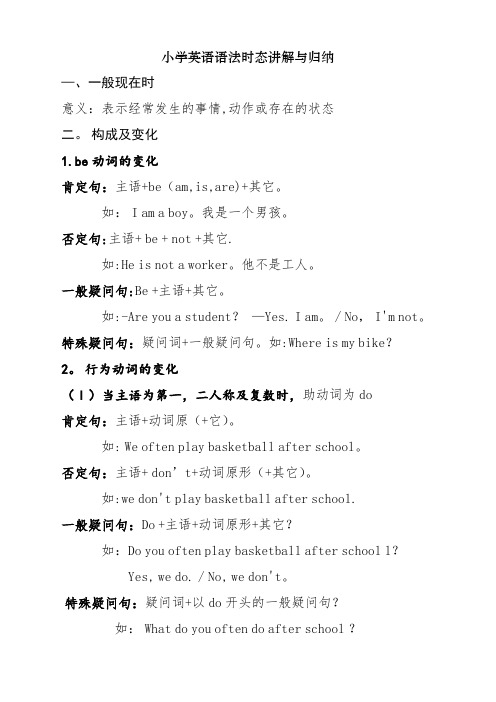
小学英语语法时态讲解与归纳—、一般现在时意义:表示经常发生的事情,动作或存在的状态二。
构成及变化1.be动词的变化肯定句:主语+be(am,is,are)+其它。
如:I am a boy。
我是一个男孩。
否定句:主语+be+not+其它.如:He is not a worker。
他不是工人。
一般疑问句:Be+主语+其它。
如:-Are you a student?—Yes.I am。
/No,I'm not。
特殊疑问句:疑问词+一般疑问句。
如:Where is my bike?2。
行为动词的变化(l)当主语为第一,二人称及复数时,助动词为do肯定句:主语+动词原(+它)。
如:We often play basketball after school。
否定句:主语+don’t+动词原形(+其它)。
如:we don't play basketball after school.一般疑问句:Do+主语+动词原形+其它?如:Do you often play basketball after school l?Yes,we do./No,we don't。
特殊疑问句:疑问词+以do开头的一般疑问句?如:What do you often do after school?(2)当主语为第三人称单数时,助动词为does肯定句:主语+动词三单式(+其它).如:He swims well.否定句:主语+doesn’t+动词原形(+其它)。
如:He doesn’t swim well.一般疑问句:Does+主语+动词原形+其它.如:Does he swim well?Yes,he does。
/No,he doesn't。
特殊疑问句:疑问词+以does开头的一般疑问句?如:How does your father go to work?三.第三人称单数的动词变化规则(只有在第三人称为主语的肯定句中,动词才用三单式)(1)多数动词直接加s:runs gets likes collets takes plays climbs…….(2)结尾是s,x,sh,ch,o,前为辅音字母,结尾加es:watches teaches goes does washes crossesmixes brushes(3)动词末尾y前为辅音:将y改为i加es:study→studies fly→flies carry→carries cry→cries但在y前如果为元音则直接加s:buys says四.时间标志:always,usually,often,sometimes,every…一般现在时练习He often (have) dinner at home.Daniel and Tommy (be) in Class One.We (not watch) TV on Monday。
小学英语语法_一般现在时详细讲解

千里之行,始于足下。
学校英语语法_一般现在时具体讲解一般现在时(Simple Present Tense)是英语中最基本的时态之一,用来表达经常性或习惯性的动作、客观事实、常规活动等。
以下是一般现在时的具体讲解。
1. 构成:主语 + 动词原形(第三人称单数要在动词后加-s)+ 其他。
例如:- I play soccer on weekends.(我周末踢足球。
)- He watches TV every evening.(他每天晚上看电视。
)2. 主语:一般现在时的主语可以是第一人称、其次人称或第三人称。
例如:- I go to school every day.(我每天去上学。
)- You like ice cream.(你宠爱冰淇淋。
)- She plays the piano well.(她弹得很好。
)3. 动词的变化:- 第三人称单数一般在动词后面加上-s或-es。
例如:he/she/itplays(he plays,she plays,it plays),he/she/it watches(he watches,she watches,it watches)。
- 一般现在时的否定形式是在动词前面加上do not(don’t)或does not(doesn’t)。
例如:I do not dance(我不跳舞),She does not like coffee(她不宠爱咖啡)。
- 一般现在时的疑问形式是把do或does放在主语前面。
例如:Do you play tennis?(你打网球吗?),Does she go to the gym?(她去健身房吗?)4. 使用场景:第1页/共2页锲而不舍,金石可镂。
- 表达经常性或习惯性的动作。
例如:I eat breakfast every morning.(我每天早上吃早餐。
)- 表达客观事实、普遍真理等。
例如:The sun rises in the east.(太阳从东方升起。
小学英语语法—时态知识点详解
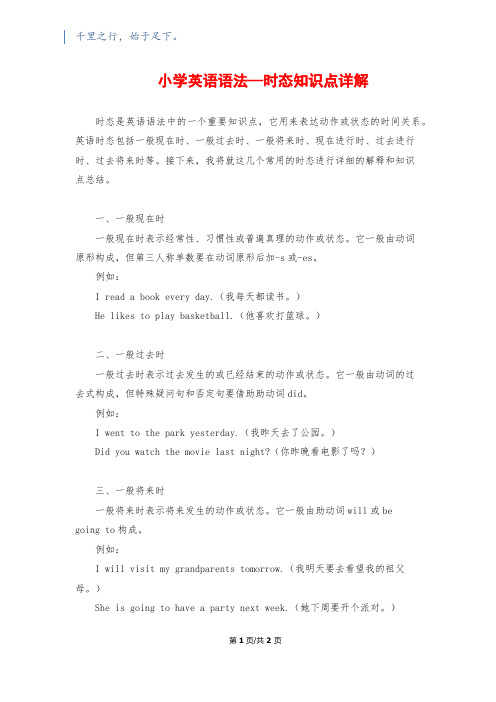
千里之行,始于足下。
小学英语语法—时态知识点详解时态是英语语法中的一个重要知识点,它用来表达动作或状态的时间关系。
英语时态包括一般现在时、一般过去时、一般将来时、现在进行时、过去进行时、过去将来时等。
接下来,我将就这几个常用的时态进行详细的解释和知识点总结。
一、一般现在时一般现在时表示经常性、习惯性或普遍真理的动作或状态。
它一般由动词原形构成,但第三人称单数要在动词原形后加-s或-es。
例如:I read a book every day.(我每天都读书。
)He likes to play basketball.(他喜欢打篮球。
)二、一般过去时一般过去时表示过去发生的或已经结束的动作或状态。
它一般由动词的过去式构成,但特殊疑问句和否定句要借助助动词did。
例如:I went to the park yesterday.(我昨天去了公园。
)Did you watch the movie last night?(你昨晚看电影了吗?)三、一般将来时一般将来时表示将来发生的动作或状态。
它一般由助动词will或begoing to构成。
例如:I will visit my grandparents tomorrow.(我明天要去看望我的祖父母。
)She is going to have a party next week.(她下周要开个派对。
)第1页/共2页锲而不舍,金石可镂。
四、现在进行时现在进行时表示现在正在进行的动作。
它由be动词的现在分词形式(-ing 形式)构成。
例如:We are watching TV now.(我们正在看电视。
)She is studying in the library.(她正在图书馆学习。
)五、过去进行时过去进行时表示过去某个时间点或过去某段时间正在进行的动作。
它由be动词的过去分词形式(-ing形式)和过去式的be动词构成。
例如:They were playing football at 5 o’clock yesterday.(昨天五点他们在踢足球。
小学英语语法时态讲解与归纳总结
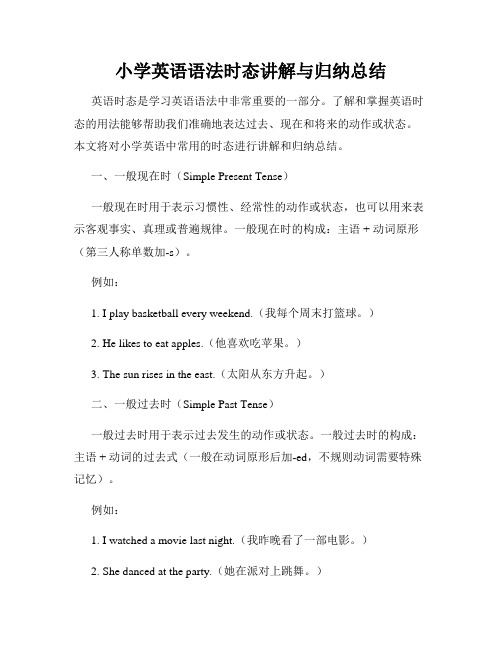
小学英语语法时态讲解与归纳总结英语时态是学习英语语法中非常重要的一部分。
了解和掌握英语时态的用法能够帮助我们准确地表达过去、现在和将来的动作或状态。
本文将对小学英语中常用的时态进行讲解和归纳总结。
一、一般现在时(Simple Present Tense)一般现在时用于表示习惯性、经常性的动作或状态,也可以用来表示客观事实、真理或普遍规律。
一般现在时的构成:主语 + 动词原形(第三人称单数加-s)。
例如:1. I play basketball every weekend.(我每个周末打篮球。
)2. He likes to eat apples.(他喜欢吃苹果。
)3. The sun rises in the east.(太阳从东方升起。
)二、一般过去时(Simple Past Tense)一般过去时用于表示过去发生的动作或状态。
一般过去时的构成:主语 + 动词的过去式(一般在动词原形后加-ed,不规则动词需要特殊记忆)。
例如:1. I watched a movie last night.(我昨晚看了一部电影。
)2. She danced at the party.(她在派对上跳舞。
)3. They visited their grandparents yesterday.(他们昨天去拜访了他们的祖父母。
)三、一般将来时(Simple Future Tense)一般将来时用于表示将来要发生的动作或状态。
一般将来时的构成:主语 + will + 动词原形。
例如:1. We will go shopping tomorrow.(我们明天要去购物。
)2. He will finish his homework later.(他一会儿会完成他的家庭作业。
)3. She will visit her friends next week.(她下周要去拜访她的朋友们。
)四、现在进行时(Present Continuous Tense)现在进行时用于表示现在正在进行的动作。
- 1、下载文档前请自行甄别文档内容的完整性,平台不提供额外的编辑、内容补充、找答案等附加服务。
- 2、"仅部分预览"的文档,不可在线预览部分如存在完整性等问题,可反馈申请退款(可完整预览的文档不适用该条件!)。
- 3、如文档侵犯您的权益,请联系客服反馈,我们会尽快为您处理(人工客服工作时间:9:00-18:30)。
小学英语语法时态讲解与归纳~~ 一般现在时
一. 意义:表示经常发生的事情,动作或存在的状态
二. 构成及变化
动词的变化。
肯定句:主语+be(am ,is ,are)+其它。
如:I am a boy.我是一个男孩。
否定句:主语+ be + not +其它。
如:He is not a worker.他不是工人。
一般疑问句:Be +主语+其它。
如:-Are you a student -Yes. I am. / No, I'm not.
特殊疑问句:疑问词+一般疑问句。
如:Where is my bike
2. 行为动词的变化。
l、当主语为第一,二人称及复数时,助动词为do
肯定句:主语+动词原形(+其它)。
如:We often play basketball after school.
否定句:主语+ don't+动词原形(+其它)。
如:we don’t play basketball after school.
一般疑问句:Do +主语+动词原形+其它
如: Do you often play basketball after school l
Yes, we do. / No, we don't.
特殊疑问句:疑问词+以do开头的一般疑问句
如: What do you often do after school
2、当主语为第三人称单数时 ,
助动词为does
肯定句:主语+动词三单式(+其它)。
如: He swims well. 否定句:主语+ doesn’t+动词原形(+其它)。
如:He doesn’t swim well..
一般疑问句:Does +主语+动词原形+其它。
如:Does he swim well
Yes, he does. / No, he doesn't.
特殊疑问句:疑问词+以does开头的一般疑问句
如: How does your father go to work
三.第三人称单数的动词变化规则(只有在第三人称为主语的肯定句中,动词才用三单式)
(1)多数动词直接加s:
runs gets likes collets takes plays climbs…….
(2)结尾是s, x, sh, ch, o,前为辅音字母,
结尾加es : watches goes does washes brushes (3)动词末尾y前为辅音:将y改为i加es:
study→studies fly→flies carry→carries
cry→cries
但在y前如果为元音则直接加s: buys says
四.时间标志:always总是 , usually经常 , often
经常 , sometimes 有时,every…每~
一般现在时练习题(1)
I.用下列单词的适当形式填空
1.We often___________(play) in the playground.
_________(get) up at six o’clo ck.
_________(brush) your teeth every morning
(do) he usually________________(do) after school
________________(study) English, Chinese, maths,
science and Art at school.
sometimes __________(go) to the park with his
sister.
eight at night, she __________(watch) TV with his
parents.
Mike________(read) English every day
Ⅱ单项选择。
( ) 1. you have a book
A. Do
B. Are
C. Is
D. Have
( ) 2. They on a farm.
A. working
B. is work
C. work
D. is worked ( ) 3. Does Peter like to watch TV A. Yes, he like B. No, he doesn’t C. Yes, he’d like D. No, he likes
( ) 4. She doesn’t her homework in the afternoon.
A. doing
B. to do
C. does
D. do
( ) 5. How Mr. Brown to America
A. do, go
B. is, go
C. does, go
D. does, goes ( ) 6. Where’s my camera I it.
A. am not finding
B. am not seeing
C. can’t find
D. can’t look at
( ) 7. How he go to work He to work by bike.
A. does, go
B. do, goes
C. do, go
D. does, goes ( ) 8. you usually late for school
No, .
A. Do, I am
B. Does, not
C. Are, I’m not
D. Are, I aren’t
( ) 9. she home at six every day
A. Is, leave
B. Does, leave
C. Is, leaves
D. Does, left
( ) 10. Mr. Yang English this term.
A. teaches our
B. teaches us
C. teachs us
D. teach our
Ⅲ改句子
you often play football after school (改为肯定句)
have many books.(改为否定句)
Shan’s sister likes playing football. (改为否定句)
lives in a small city near New York.(改为一般疑问句) watch TV every day.(改为一般疑问句)
has four lessons.(改为否定句)
plane is
fast.
否定
句:
一般疑问
句:
usually play football on Friday afternoon. 否定句:
一般疑问句:
划线提问。
